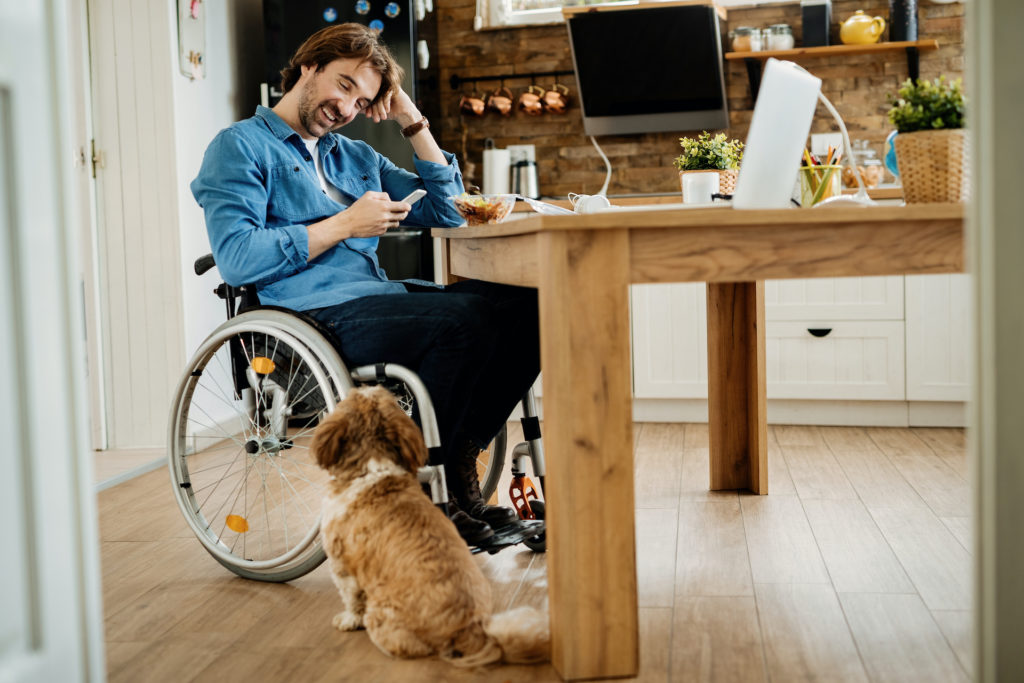
Finding an apartment that’s well-located, adequately equipped, and affordable is often challenging, and it’s even more difficult for people with disabilities. However, if you know exactly what you need in your new apartment and its surrounding area, it makes the task a lot easier.
Understanding Your Rights and Challenges as a Renter with Disabilities
Before you start looking for a wheelchair-accessible apartment, it’s essential to know your rights as a renter with disabilities. In most cases, the Americans with Disabilities Act (ADA) doesn’t apply to residential buildings. It only applies to public spaces such as offices, stores, restaurants, hospitals, and libraries. In an apartment building or complex, only the leasing office, club rooms, and other publicly accessible spaces are subject to the ADA.
Nonetheless, all apartments are required to comply with the Fair Housing Act, which extends the same rights to all renters regardless of gender, race, religion, familial status, or ability status. This means that landlords or property managers are required to negotiate with you, rent an available apartment to you, and set the same terms for you as they would for other renters. Additionally, they can’t refuse reasonable requests for modifications that improve accessibility, but they also don’t have to pay for those modifications.
An additional challenge is cost. Wheelchair-accessible apartments are typically more expensive than non-accessible ones. Owners of apartment buildings have to spend a lot to widen doorways, add ramps, and make other accessibility modifications, so they’ll charge higher rental rates to make up for the extra cost. Social Security Disability Income or Supplemental Security Income is almost always insufficient to cover the rent on an accessible apartment. You can try to get Section 811 assistance to offset some of your rental expenses.
How to Find Wheelchair-Accessible Apartments
Despite the challenges you may face, you’ll still be able to find a good deal on a wheelchair-accessible apartment if you have the necessary information. Take the following steps to find your ideal apartment.
Whether you’re moving to a small town or big city, you should try to look for an apartment in a disability-friendly neighborhood. When you’re doing research on a particular neighborhood, find out about the amenities available there, including transportation options, shops, restaurants, bars, and recreational facilities. Then, look at the sidewalks and public spaces to make sure the area is accessible and suitable for you.
Use a Wheelchair-Accessible Apartment Filter
After you’ve chosen a wheelchair-friendly neighborhood, you can proceed to look for a suitable apartment. The best way to do this is to use an online accessible apartment finder. Apartment rental websites, such as Zumper, have a “wheelchair accessibility” filter that enables you to narrow down your search results to only accessible apartments. You can also use a wide array of other filters to further fine-tune your search, such as neighborhood, price, number of bedrooms, and pet-friendliness. Once you’ve found the right apartment, you can request a tour, submit your rental application, or contact the owner or real estate agent.
Check out these wheelchair accessible apartments:
Wheelchair accessible apartments in San Francisco
Wheelchair accessible apartments in Chicago
Wheelchair accessible apartments in Dallas
Wheelchair accessible apartments in Philadelphia
Wheelchair accessible apartments in Houston
Wheelchair accessible apartments in New York
Federal and Nonprofit Programs for Accessible Apartments
As a renter with disabilities, you’re eligible for many federal and nonprofit programs that provide housing assistance. Some examples of these programs include:
- United States Department of Housing and Urban Development (HUD) programs: HUD offers a number of housing vouchers and programs for people with disabilities, including Non-Elderly Disabled Vouchers, Section 8 Housing Vouchers, and the Section 811 program.
- United States Department of Labor (DOL) housing grants: Through a partnership with HUD, DOL provides grants to nonprofit and charitable organizations that in turn offer vouchers to renters with disabilities.
- Accessible Space: This nonprofit organization is dedicated to helping people with disabilities find suitable accessible housing.
- Volunteers of America: Volunteers of America is a nonprofit that develops affordable housing across the country, including housing for people with disabilities.
- Habitat for Humanity: This Christian nonprofit organization offers housing for people with disabilities based on their needs.
What to Look for in an Accessible Apartment Tour
While touring an apartment, whether virtually or in-person, you need to be on the lookout for certain features to determine if it’s truly wheelchair accessible. These features include:
- Handicap parking
- Entrance ramps
- Wide doorways
- Support bars
- Elevators
- Hardwood floors
- Door handles instead of doorknobs
- Rocker light switches
- Accessible appliances with knobs in front
- Low countertops
- Accessible sinks
- Single-lever faucets
- Front-loading washing machine and dryer
- Personal alarm system
Ask the Right Questions
During your apartment tour, you should also ask the landlord some questions to make sure the apartment is suitable for you. You need to ask both general questions about renting the apartment and questions that are related to your personal situation. If you have many questions, don’t hesitate to ask them all. It’s important that you clear all your doubts before you sign the lease. Some of the questions you should ask your landlord include:
- Does the building have elevators?
- If I need to make modifications, do I have to place a down payment for returning my apartment to its previous condition when I move out?
- Where are all ramps in this apartment building located?
- Where are the nearest handicapped parking spaces?
- Do the nearby amenities have accessibility features?
- Do you plan to do any renovations in the future that may make the building more or less accessible?
- What’s the best way to reach you if I need information or assistance?
Start using the accessible apartment finder on Zumper today to look for an apartment that perfectly meets your needs and preferences.



